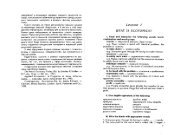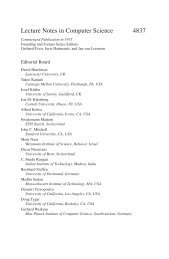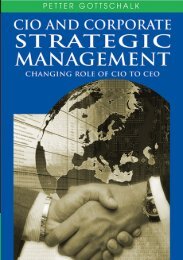LNCS 2950 - Aspects of Molecular Computing (Frontmatter Pages)
LNCS 2950 - Aspects of Molecular Computing (Frontmatter Pages)
LNCS 2950 - Aspects of Molecular Computing (Frontmatter Pages)
Create successful ePaper yourself
Turn your PDF publications into a flip-book with our unique Google optimized e-Paper software.
where:<br />
Membrane <strong>Computing</strong>: Some Non-standard Ideas 325<br />
More formally, a P system with migrating rules is a construct<br />
Π =(O, C, T, R, µ, w1,...,wm,R1,...,Rm,D1,...,Dm,io),<br />
1. O is the alphabet <strong>of</strong> objects;<br />
2. C ⊆ O is the set <strong>of</strong> catalysts;<br />
3. T ⊆ (O − C) istheset<strong>of</strong>terminal objects;<br />
4. R is a finite set <strong>of</strong> rules <strong>of</strong> the form u → v, whereu ∈ O + ,v ∈ O ∗ ;the<br />
catalytic rules are <strong>of</strong> the form ca → cu for c ∈ C, a ∈ O−C,andu ∈ (O−C) ∗ ;<br />
5. µ is a membrane structure <strong>of</strong> degree m, with the membranes labeled in a<br />
one to one manner with 1, 2,...,m;<br />
6. w1,...,wm are strings over O specifying the multisets <strong>of</strong> objects present in<br />
the m regions <strong>of</strong> µ at the beginning <strong>of</strong> the computation;<br />
7. R1,...,Rm are subsets <strong>of</strong> R, specifying the rules available at the beginning<br />
<strong>of</strong> the computation in the m regions <strong>of</strong> µ;<br />
8. D1,...,Dm are sets <strong>of</strong> pairs – we call them metarules –<strong>of</strong>theform(r, tar),<br />
with r ∈ R and tar ∈{here, out, in} associated with the m regions <strong>of</strong> µ;<br />
9. 1 ≤ io ≤ m is the output membrane <strong>of</strong> the system, an elementary one in µ.<br />
Note that the objects from regions are present in the multiset sense (their<br />
multiplicity matters), but the rules are present in the set sense – if present, a<br />
rule is present in principle, as a possibility to be used. For instance, if at some<br />
step <strong>of</strong> a computation we have a rule r in a region i and the same rule r is sent<br />
in i from an inner or outer region to i, then we will continue to have the rule r<br />
present, not two or more copies <strong>of</strong> it.<br />
However, if a rule r is present in a region i, then it is applied in the nondeterministic<br />
maximally parallel manner as usual in P systems: we nondeterministically<br />
assign the available objects to the available rules, such that the assignment<br />
is exhaustive, no further object can evolve by means <strong>of</strong> the existing rules. Objects<br />
have no target indication in the rules <strong>of</strong> R, hence all objects obtained by applying<br />
rules remain in the same region. However, the applied rules move according<br />
to the pairs (r, tar) fromDi.<br />
Specifically, we assume that we apply pairs (r, tar), not simply rules r. Forinstance,<br />
if in a region i we have two copies <strong>of</strong> a and two metarules (r, here), (r, out)<br />
for some r : a → b which is present in region i, then the two copies <strong>of</strong> a can<br />
evolve both by means <strong>of</strong> (r, here), or one by (r, here) andoneby(r, out), or both<br />
by means <strong>of</strong> (r, out). In the first case, the rule r remains in the same region, in<br />
the second case the rule will be available both in the same region and outside<br />
it, while in the third case the rule r will be available only in the region outside<br />
membrane i (if this is the environment, then the rule might be “lost”, because<br />
we cannot take it back from the environment). Anyway, both copies <strong>of</strong> a should<br />
evolve (the maximality <strong>of</strong> the parallelism). If r is not present, then a remains unchanged;<br />
if a is not present, then the rule is not used, hence it remains available<br />
for the next step.
















